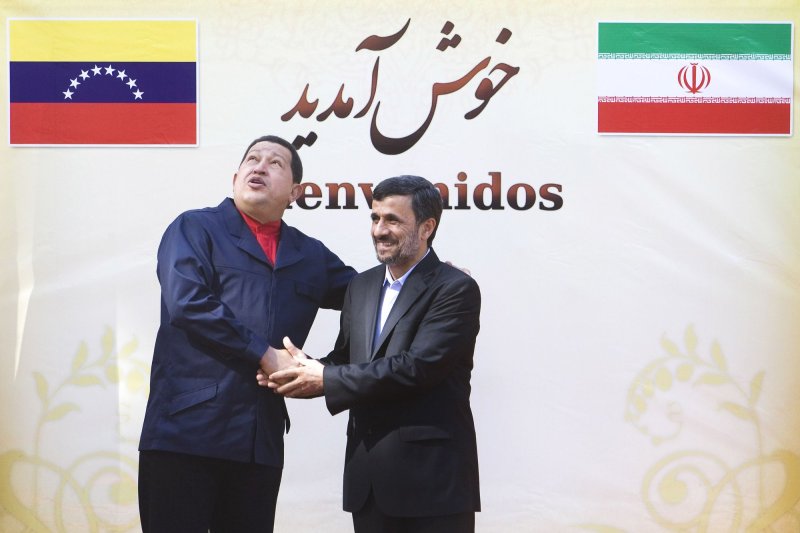Iranian President Mahmoud Ahmadinejad embraces Venezuela's President Hugo Chavez in Tehran, Iran on October 19, 2010. Chavez is among the leaders Ahmadinejad will be visiting during his tour. UPI/Maryam Rahmanian |
License Photo
WASHINGTON, Jan. 10 (UPI) -- Iranian President Mahmoud Ahmadinejad is making a pass through Latin American capitals this week as tensions between Iran and the United States continue.
His first stop is Venezuela, where the Iranian got expected public support for Iran's imbroglio with the Washington and the European union from anti-American President Hugo Chavez.
"One of the targets that Yankee imperialism has in its sights is Iran, which is why we are showing our solidarity," Chavez said at a news conference Monday. "When we meet, the devils go crazy."
"We will discuss the hegemonic system's efforts to interfere in countries and establish its military presence there," Ahmadinejad told the semiofficial Fars news agency Sunday before leaving for Caracas.
The rhetoric was not unusual for the two, but it came as the United States and the European Union tighten the economic noose on Iran over its nuclear development program, which is suspected to be a precursor to nuclear weapons development.
In late December, U.S. President Barak Obama signed legislation that poses the most serious consequences to date in a long string of sanctioning. Under the legislation, the United States could bar any foreign financial institution conducting transactions with Iran's Central Bank from dealing with U.S. organizations. It is those dealings – mainly payments for oil exports – that keep the Tehran regime from financial collapse.
About 60 percent of the Iranian economy is dependent on oil exports, which also account for about 80 percent of its foreign exchange earnings. It not only pays for Iran's scientific and military endeavors but also government food subsidy programs for its people.
New U.S. sanctions won't come for months yet, but Iran is busy looking for friends, especially so since EU members later this month are expected to implement a ban on importation of Iran crude and petroleum products.
Meanwhile, China, an opponent of sanctions against Tehran, which is a recipient of Chinese oil, is said to be demanding discounts on its petroleum imports given the international pressure faced by the Iranian government. It has also called for a lessening of tensions.
No wonder. China's oil from Iran passes through the Strait of Hormuz, a vital choke-point leading from the Persian Gulf to the Sea of Oman and beyond to Asia. About one-third of the world's tanker-borne crude oil supplies – from Iran, Kuwait, Saudi Arabia and others – pass through the Strait on any given day.
Iran, in the face of increasing economic pressure, has repeatedly threatened to shut down the waterway, which is only about 24 miles wide at its narrowest point, and thus landing a body blow to work economies, including its own.
Many months of negotiations – canceled, re-started and then canceled again – between Western powers and Tehran over its nuclear fuel enrichment now appear to have strengthened Western resolve to keep Iran from joining the list of nations possessing nuclear arms.
Western suspicions, combined with reports from the U.N. atomic energy agency, have been further fueled by Tehran itself and reports that the so-called peaceful enrichment-level achieved by Iran has reached the stage where additional enrichment to weapons-grade uranium is could be closer than originally thought. It's placement of enrichment facilities in underground locations, adds to the unease.
But if Ahmadinejad hopes for tangible and effective efforts by Latin American allies to strengthen Iran in his face-off with the West, he may have another thing coming. Supportive rhetoric from allies, yes; action, iffy at best. Venezuela, although decidedly anti-American, needs to tread a fine line. Like Iran, it earns about 80 percent of its foreign exchange through the exportation of crude oil, funding Chavez's social programs. But about 60 percent of that production goes to the United States. To choke off oil to the Yanqui to the north would cripple an economy already under strain. And the other nations have few natural resources with which to back up Ahmadinejad.
No one doubts that any armed conflict between Iran and the U.S. 5th Fleet, which is based in the Gulf and which is charged with keeping the oil route open, would cause economic difficulties. But given U.S. military power, closure and/or disruption would be temporary. And reports surfaced recently that nations – including the United States and some EU countries – that are members of the International Energy Agency are already dusting off the books to investigate lessening the impact of a closure of the Strait on industrialized nations by sharing their individual strategic oil reserves.
Given that, Ahmadinejad's globe hopping appears more a window dressing of confidence and a message to a restless population at home that Tehran is a world player and has supporters in its fight against the "great satans."





